2014
Robin Hood, Eat Your Heart Out



Click pic to play animation
Readers of TerryColon.com might remember a video of the fastest archer in the west linked to a while back. The man, Lars Andersen, is back with a new, even more amazing video.
Lars Andersen: a new level of archery
Spoiler Alert: I recommend seeing the video before reading my takeaway on it.
Imagine a typical scene near the end of a Hollywood swashbuckler where the hero has run out of arrows and the evil villan has him dead to rights, ready to deliver the coup de grâce. With a sneer the black hat unleashes an arrow at our seemingly helpless hero… quick as a flash our hero catches the arrow in mid-air and shoots it back skewering the villan through his black heart. The smug look on the villan’s face turns to shock as he keels over dead to the wild cheers of theater-goers.
Seems farfetched? Did you watch the video? Lars Andersen does that and more.
Filed 12/30/14
Putting the X in Xmas

Looks like my neck of the woods is not going to have white Christmas, but a clear christmas. Or whatever you’d call it. The weatherman is calling for rain, not snow. Though I don’t think I’ll be supplanting a festive snowman with a rainman. White or not in your area, here’s hoping it’s a merry Xmas. Which leads us to… why X in Xmas? Where’d that come from?
Abbreviations used as Christian symbols go way back. The New Testament was written in Greek, the first two letters of Christ in Greek are chi and rho. These form the chi-rho monogram on the snowman’s umbrella in the illustration above. The Christian Roman Emperor, Constantine, used it on his banner.
Remove the rho and you have a chi, a simple X. Still, when and exactly how X for Christ came about is not known. By the fifteenth century Xmas for Christmas was widely used. Back in the day, X in place of Christ also gave you Xian for Christian and Xianity for Christianity. These uses are no longer widespread, meaning not at all.
While nobody has every wished anyone a merry Fishmas, you might wonder about the origin of the fish as a symbol of Christ. One theory is it comes from the phrase “Jesus Christ Son of God Savior.” The initial letters of the phrase spell the Greek word for fish, ichthus. Jcsgs doesn’t spell ichthus, but with the Greek alphabet it does. Whether this is the true origin, nobody really knows.
Filed 12/24/14
“Wow, I Never Knew That!”

One imagines most folks figure they know everything there is to know about how to use common, every-day items. After all, they’re common and are used every day. However, there are relatively unknown built-in functionality in the likes of Tic Tac packages and to-go cup lids. Once you discover these features perhaps you’ll start looking at and using commonplace items differently. I can almost guarantee when you see what you’ve been missing you’ll say, “Wow, I never knew that!”
Daily Items That You’ve Probably Never Used Correctly
Along the same lines there’s also “So that’s what that’s for” or “So that’s how that works.” For the non-verbally inclined there’s always the wide-eyed jaw drop. You can add a hand on the top of the head gesture as desired.
Then there’s “Oh, now I get it” for things that should have been obvious, and maybe were to everyone but you. Alternative reactions might be “Of course!” or “D’oh! I’m an idiot.” Non-verbal alternatives include the forehead slap and, for the less demonstrative, the sheepish grin. Use the acting choice appropriate to your own character.
Going slightly further afield there’s “I should have seen that.” A head nod goes well with that. This falls more under the category of revealed unintended consequences. Like when you try some clever new way to do something that turns out not to be very clever. Which may evoke a “Now I see why they don’t do it that way.” This can also be accompanied with a head nod. Or a trip to the emergency room depending.
Filed 12/19/14
Inedible Leftovers

sparts noun, plural. Spare parts left over when you build, rebuild, or repair something which still seems to work OK without them. For now.
Admit it, guys, our DIY projects often yield sparts. In which case DIY stands for Destroy It Yourself. Many sparts are washers of some kind. Which don’t seem all that essential, but they’re there for a reason only engineers seem to know. I mean, if they didn’t do anything all the various kinds of washers never would have been invented in the first place.
On the other hand there’s ghost parts. Screws, nuts, and do-dads that seem to have vanished somewhere during the process. Though they’re not really on the other hand, they’re not on hand at all. Springs are especially prone to bound off somewhere and hide. Oh well, I guess you really only need three lug nuts to hold that wheel on.
Anyway, sparts are simply tossed in the junk drawer or plunked in some dusty container in the garage where they eventually become mystery parts. Sort-of like all those keys in your desk drawer for doors and padlocks that may or may not exist. Maybe the padlocks are in some other dustier container in the attic. You may never know.
Also see duhjustment and dimprovement
Filed 12/16/14
The Casual Sportsman
Politically Correcting Team Nicknames
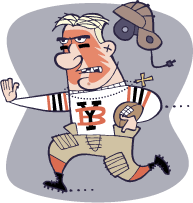
Having lived there, it’s no great stretch imagining correct opinion in Fan Francisco is against the Washington Redskins in the cause célèbre du jour, the team name. After all, just down the peninsula Stanford University dropped the team name Indians in favor of Cardinal. Except, shouldn’t folks with the correct view of the separation of church and state object to that name? Stanford, a state supported school, the Cardinal? It’s like naming your team the Pope.
On the other hand, shouldn’t denizens of the Bay Area object to their NFL team’s name, the San Francisco Forty-Niners? Not the 49er part, the San Francisco part. After all, the city is named after a Catholic Saint. How do they let that go unchallenged? Then again, since the year 1849 is from the Christian calendar, maybe the name 49ers should go, too. How does the Yerba Buena Gold-Diggers sound to you?
One last thing, the Washington Redskins franchise started in Boston as the Braves. When the team moved to Fenway Park, home of the Red Sox, they changed the name to Redskins. The team name doesn’t really refer to an American Indian’s natural skin coloration, it evokes the red warpaint used to look fierce.
The team could have saved all the current gnashing of teeth had they renamed themselves the Washington Warpainted Warriors. Nicely alliterative, no? Their website could be www.www.com.
Filed 12/11/14
“The Little Boat Gently Drifted Across the Pond Exactly the Way a Bowling Ball Wouldn’t”

It’s hard to deliberately write as funny as some folks write accidentally funny. Though maybe knowing the writers were serious makes it funnier somehow. Just this sort of unintentional humor appeared some 40 years or so ago in Anguished English by Richard Lederer. Here’s a sampling:
Bach died from 1750 to the present. Bach was the most famous composer in the world and so was Handel. Handel was half German half Italian and half English. He was very large.
Silly as it is, it still makes me laugh. For a taste of this timeless humor read World History According to Students Bloopers.
In the same vain there’s these gems also culled from student essays:
The lamp just sat there, like an inanimate object.
He was as tall as a 6'3" tree.
The little boat gently drifted across the pond exactly the way a bowling ball wouldn’t.
Some of these Analogies and Metaphors From HS Student Essays made me laugh out loud till my eyes watered. Though maybe I was in just the right mood. If you’re in the mood to have your funny bone ticked follow the links.
Filed 11/30/14
What’s the Other Thing Coming?

If you think (such-and-such), you have another thing coming.
Which basically means “Think so? Think again.” No confusion about that. Still, when you delve into it, what is the thing coming? What thing have we got where there’s to be a follow-up thing? How do we get a thing because we think the such-and-such? One explanation offered is the expression is a mishearing of the original:
If you think (such-and-such), you have another think coming.
This is closer to “Think so? Think again.” and so seems plausible. Except it’s grammatically awkward; a verb, think, replaces a noun, thing. You can think, have a thought, even think a thought, but can you have a think? Maybe, I’m not sure. Some verbs work as nouns. You can talk or have a talk. On the other hand, you can speak, but you can’t have a speak. So maybe the theory is right, I wonder.
My theory is the expression has always been, “you have another thing coming.” You know how you sometimes preface some additional thing you want to say with, “and another thing”? That’s what the expression is saying, that’s the thing you have coming, a correction for what you’re thinking or saying.
At least that’s my story. And if you think I’m going to change my mind, you have another think coming.
Filed 11/28/14
Fat for Fitness
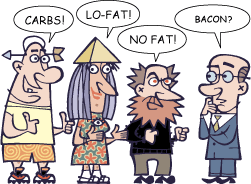
According to the articles linked to below, carbs are fattening, not fats. Carbohydrates enter your system as simple sugars stimulating your body’s insulin production. Insulin helps store sugar in the body as fat. Raise your insulin and sugar levels to excess and you get fat. Meanwhile, fat does not increase insulin and so the body creates less fat storage.
Is it only a coincidence that obesity rates have risen in the age of lo-fat and no-fat? Seems all that “healthy” low-fat dietary advice the experts have been feeding us did a fat lot of good. They’ve been pounding the anti-fat drum for decades now, wonder how long it will take to convince folks they were 180 degrees wrong all along.
Looks Like The Medical Establishment Was Wrong About Fat
Why Experts Now Think You Should Eat More Fat
Filed 11/26/14
Follow the Directions Carefully

The linked bit reminded me of a pic I did for Suck.com many years ago. So I used it here. As Wally Wood said, “Never draw what you can copy. Never copy what you can trace. And never trace what you can cut out and paste down.” We can do the last one now-a-days without scissors and paste. No muss, no fuss. Aren’t we modern and lucky?
Filed 11/19/14
When Abbreviations Become Words

The Bosox fan exited the Soho gym and hailed a taxi cab. Spotting a burger ad on the side of a bus, he pulled out his cell phone and called the lab to see if lunch was ready.
Not much of a story, but an example of informal language. How so? Let’s repeat the paragraph to show what I’m getting at.
The Boston Red Sox fanatic exited the South of Houston gymnasium and hailed a taximeter cabriolet. Spotting a hamburger advertisement on the side of an omnibus, he pulled out his cellular telephone and called the laboratory to see if luncheon was ready.
The top paragraph uses short, informal versions of longer words in the second paragraph. In some cases the parent word is so out of use it’s archaic. People might still say hamburger advertisement, but who says taximeter cabriolet now-a-days? The informal versions are sort-of abbreviations without a period. Though in a case like bus they lopped off the first bit instead of the last. All the same, folks don’t speak in abbreviations. It might read mr. on the page, but you still say mister and not m-r.
In case you’re wondering, a cabriolet is a vehicle with separate driver and passenger compartments. Taxi means to move along the ground, like how a plane might taxi. A meter is a measuring device. Put it all together and you get a taxi cab.
Then again, you could simply call it a taxi or a cab. Or a hack, short for hackney carriage. A taxi is an auto, usually a car or a minivan. Auto is short for automobile, mini comes from miniature, van is short for caravan and car is from cart. Or you could take a limo… it just won’t stop.
While sox might seem like gimmick spelling that’s how they used to spell socks. You’ll sometimes see it in old books. Another thing you may run across in those dusty tomes is to-day and to-morrow. When, exactly, did they do away with the hyphens? And why were they ever there to begin with?
Filed 11/13/14
Everybody Agrees It’s Gotta Be Right
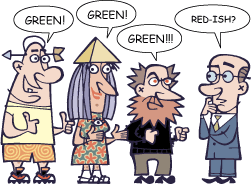
A pair of quotes without comment from Bertrand Russell:
“The fact that an opinion has been widely held is no evidence whatever that it is not utterly absurd; indeed in view of the silliness of the majority of mankind, a widespread belief is more likely to be foolish than sensible.”
“The whole problem with the world is that fools and fanatics are always so certain of themselves, but wiser people so full of doubts.”
Filed 11/4/14
Confabulation –That’s Not the Way I Remember It

Some time back I was telling a story of something that happened to me. I don’t recall the story, but that’s beside the point. Anyway, after telling the tale my brother says, “Wait a second. That wasn’t you, it was me.” Oops.
Now, I’m not the only one this sort of thing happens to. A woman I knew said she remembered me doing a back-flip on the dance floor in some club. I’ve never done a back-flip in my life, and told her so. She insisted I was wrong, she remembered it distinctly. Which leads us to definition two below…
confabulate (kən făb′ yə-lāt) intr.v. 1. To talk informally, chat. 2. To replace fact with fantasy in memory.
Perhaps you’ve fallen victim to this. You’re pretty sure it happened, but was it a dream maybe? Or something you heard or read? Or some repressed memory some psychiatrist helped you “recover”? Memory is a funny thing. It can fool you.
A lot like the supposed 150,000 or so people who distinctly remembered being at the game where Babe Ruth called his homerun. In my case the remembered event actually happened, just not to me. Whether that’s true confabulation or something else I can’t say. But it’s close enough for Blab.
You don’t run across the word confabulation very often, though you’ve likely come across the shortened, informal version of definition one: confab. Perhaps those same baseball fans also recall a confab on the mound after the Bambino’s called shot.
Filed 10/31/14
Catch As Cats Can With Space Age Cookware

Build a better mousetrap and the world will beat a path to your door.
At least, that’s the old saw. It’s not really true, of course. Lots of people have invented mousetraps over the years, there’s dozens of them. Inventive folks keep trying to improve all sorts of things other than mousetraps. Things most of us never imagined needed improvement. Things with a form more-or-less set for decades or even centuries. Like a hammer or pencil or everyday pots and pans. Well, those last two have been redesigned. Not just for looks, but for basic function. And it took a rocket scientist to do it. No joke.
If you are familiar with air-cooled engines, like on a motorcycle, you know they dissipate heat with a series of fins. Air flows through the channels between the fins and carries away heat. The new and improved pots and pans use this idea in reverse. They have fins on the side to capture heat from hot air flowing up the sides of the cookware.
Like another thing they say, There’s more than one way to skin a cat. Why people would want to skin cats I couldn’t say. I suggest a better use for cats is to catch mice. A-a-a-and, we’re back.
Filed 7/30/14
How Many Ideas Do You Have per Day?

A brother gave me an urban myth calendar this past Christmas. Many of the reported myths I’ve never come across. One of which was, “The human brain will on average have 7,000 thoughts a day.” The calendar declares this a myth with the correction, “The average brain actually has 70,000 thoughts per day, which means almost 3,000 per hour over 24 hours!”
Now then, that’s 50 thoughts a minute. Or one thought every 12 seconds. Which has me wondering, what constitutes a thought? What are they measuring? How many thoughts went into my writing this entry? How many were in the reading of it? Does thinking consist of discrete packets of thoughts or is it more a continuum as expressed in the old idiom, train of thought?
Can you relate to the statistic of 70,000 thoughts a day? Aren’t a lot of statistics like that, essentially meaningless? Like the number of grains of sand in a cubic foot. It’s information you can’t really use. Except maybe to repeat as trivia. One last thing, is there a difference between a thought and an idea?
Filed 7/5/14
The Casual Sportsman
Soccer’s Wildly Improbable Medical Palpitations (WIMP)



Click on the player’s shorts to see soccer knee in action. Like in real soccer, it only takes a click. Click on the player’s jersey to see the Rivaldo reflex in action. Click on the fallen player to reset.
If you’ve been watching the World Cup, you might have noticed soccer players are unlike any other athletes, their reflexes and nervous systems are unique. But not in a good way. This comes from having balls constantly rattling off their heads as well as years of resisting the natural inclination of normal people to catch, hit, carry, or in some way touch a game ball with their hands. This results in wildly improbable medical palpitations, or WIMP.
One type of WIMP is soccer knee, which occurs whenever a soccer player is bumped in any way below about waist level. Both knees quickly bend so the legs fold up under the player, the arms fly out and up as they fall to the ground. While this seems quite comical to anyone who has ever played any kind of contact sport like American football or rugby and has never fallen this way from even the roughest hit, soccer knee is instantly disabling and very painful. That’s why a player who gets it cries out and rolls around on the ground in pain for several minutes.
Soccer players nervous systems are also rewired, so to speak, so any bump from about the waist up causes excruciating pain in the face. When this happens a players legs go flaccid and they topple over holding their face. After the initial shock the player will repeatedly look at the sweat on his hands thinking it is blood but not being quite sure. This is called the Rivaldo reflex after the Brazilian international who had an extreme case of this disorder where a soccer ball hit to the hip felt like a head-butt. Watch the video.
In some cases a near miss, a leg brushing the shorts or a hand waved past the head, is enough to set off a sympathy reaction every bit as real as the real thing. There is no known cure for any kind of WIMP. The only treatment offered is referee witch doctors waving small pieces of colored cardboard. Though usually at the player who bumped the sufferer and not at the patient himself. Oddly, a player does recover more quickly if the referee simply ignores the episode and allows play to continue.
Filed 7/1/14
The Casual Sportsman
There’s Too Many Footballs

It’s quadrennial World Cup time again and… I’m making no predictions or team comments. I don’t care enough or know enough about it. The World Cup is basically the super Super Bowl of football. Well, what everyone else but Americans call football. Which is my segue into…
Why are there so many footballs? Or rather, so many games called football. There’s American gridiron football, which Americans just call football. Then there’s soccer, which everyone but Americans call football, or futbol, or some equivalent in different languages. Then there’s rugby football, Australian football, and Gaelic football.
There’s more foot in some footballs than others. In soccer (association) football there’s a lot of ball kicking going on, Australian football and Gaelic football there’s a medium amount. Rugby football and American football might have the least amount of kicking going on. Kicking the ball, anyway.
Soccer football has a round ball. The others have an ovoidal ball, or whatever the term would be. Except maybe Gaelic football, I’m not sure. So maybe they’re not true balls at all. Which would mean American football has very little foot to it and no ball. Perhaps it should be called something else. What might that be? Runball? Carryball? Scrimmage rugby? Footobloid? Ameriball?
One last bit of frivia, American football is the only football where they haven’t festooned the ball with wacky designs. It’s still plain brown with white laces. Sometimes it has stripes in high school and Pop Warner, but still basically brown. Wonder if those patterns on a soccer ball help or hurt the players follow the ball’s flight. Do they study that?
One more thing, what’s with soccer players and the two different colored day-glo shoes?
Filed 6/17/14
The Little Girl Who Put the Pop in Popsicle

Some things are discovered or invented by accident, like penicillin and Silly Putty for instance. Some words or names which seem to be related or have a common origin, don’t. Both of these apply to that summer treat on a stick: the popsicle.
The popsicle was accidentally invented in 1905 when eleven year-old Frank Epperson mixed up some soda pop from the then popular “soda water powder” and left it outside in freezing weather. He remembered this happy accident and in 1923 developed a flavored ice treat product which he named after himself, Epp’s icicles, shortened to Epsicles.
While Mr. Epperson’s friends might have used the nickname Epp, his children didn’t and they wouldn’t call his iced treats Epsicles. Still his kids gave him all due credit and called them after their pop, pop’s icicles. And so Epsicles became popsicles and are so called today.
While popsicles were derived from soda pop, the name doesn’t refer to that at all. As far as it goes, they might have been papasicles or dadsicles. Or worse, Fredsicles.
Filed 5/21/14
Remember Cracked?

I just sold an old cartoon I did for Cracked years ago to Reader’s Digest. In fact, it appears somewhere in the Cracked archives as part of a larger article. It’s fair to peek, but you’ll never guess which it is. There’s a hint in the pic. If you do guess right… there is no prize. The articles are their own reward. Me, I got paid as a reward. No brag, just fact. Okay, a little brag in fact.
So go ahead and take a trip down memory lane and enjoy them again. Assuming you enjoyed them before. If you never saw them before, take a stroll up retro street and enjoy them for the first time. Assuming again. As a bonus, I just added two new old Cracked bits I dug out of the archives.
CRACKED’s Plan to Balance the Federal Budget in ONE Year
Filed 4/10/14
Wodin Was There on Wednesday, But No More
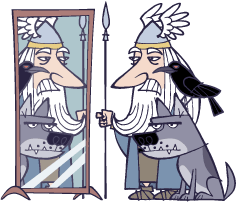
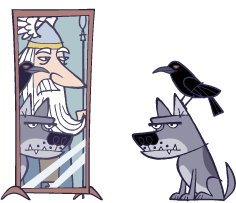
Do Brits make fun of the way you say mirror? They did me. Even English-speaking Brazilians thought the way I said mirror was amusing. To them it sounded like I was saying mere with one syllable, and not mirror with two. Still, in England they call a vest a waistcoat, and pronounce it weskit. Which leads us to…
haplology (hăp lŏl′ ə-jē) noun. Phonetics. The shortening of a word by contraction of a sound or syllable in its pronunciation.
syncope (sĭn′ kə-pē) noun. Grammar. The shortening of a word by the omission of a sound, letter, or syllable from the middle of the word.
Which one of those applies to how I say mirror I don’t know. In any case, we also have the word drawer which sounds like roar with a D tacked on the front end. Then there’s Wednesday, which started as Wodin’s day, and now is said simply as wenzday. While the spelling still reflects its Norse origin, Wodin himself has faded away.
Filed 4/4/14
Hello Then
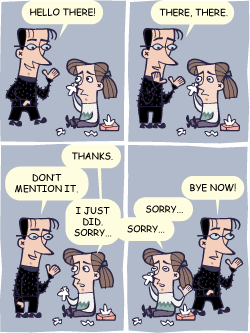
Common idiomatic sayings that don’t make much sense if you examine them too much:
Hello there
Bye now
Don’t mention it
There, there
“Hello here” and “hello yonder” don’t make any sense, so what’s with “hello there”? What’s location got to do with it?
I get “buy now!” but “bye now”? Is that a farewell with an expiration date? You wouldn’t say “bye later“ or “bye tomorrow” would you? Though folks sometimes say “bye then.” Which means the same thing as “bye now.” When is it, now or then? I don’t get it.
People only say “don’t mention it” after someone just mentioned it. Wouldn’t you have to say “don’t mention it” before they mention it? Saying it after is too late, the cat’s already out of the bag. Why there was a cat in the bag is another mystery. Kind of a creepy thing, keeping a cat in a bag.
“There, there” is what we say to comfort people in distress. There what? There where? What’s there? It doesn’t seem to mean anything at all. It might as well be any two words as far as I can tell. My, my.
Filed 3/31/14
The Truth Behind Henry Ford’s $5-a-day Wage

There’s this notion floating around about how Henry Ford doubled auto worker wages so that they could then afford to buy his cars, increasing sales, making him richer than ever. This makes no sense whatever. It’s pretty surprising anyone, let alone an economist, believes it.
When Mr. Ford set up his production line he created an unforeseen problem. The work was so mind-numbingly tedious and demanding people wouldn’t stick it out. They quit in droves. Sometimes leaving after lunch on the first day. This was very disruptive to production, it lowered productivity. Also, hiring and training a constant stream of new workers was expensive.
To solve the turnover problem Mr. Ford doubled wages as an incentive to get workers to stay on the job. Experts at the time thought it was nuts, but it worked. It was cheaper and less disruptive to increase wages than to constantly hire and train new workers. Productivity increased, overhead went down, profits went up.
On the other hand, raising your own labor costs so employees can then buy the very product they make can never make you money. Even if workers spend 100% of their raise buying the product the best you can ever do is break even. The same amount of money goes out and then returns. There are reasons to raise wages, Mr. Ford showed one reason, but so workers can buy their own production is not one of them.
Filed 2/26/14
Expand Your Nearly Useless Vocabulary

Every now and again you run across the odd odd word you don’t run across very often. Some are technical terms or jargon. Others just strike you as peculiar words. They look strange and sound weird when you say them in your head. I ran across a few in the last couple of days.
octothorpe (ŏk′ tō thōrp) noun. The symbol (#).
Octothorpe was coined by Bell Labs in the 1960s. It’s what we call the pound sign, the number sign, or a hashtag. Somehow octothorpe never caught on outside the laboratory. I wonder if they even use it there.
jeremiad (jĕr ə-mī′-əd) noun. A prolonged literary lamentation or complaint; a written cautionary or angry harangue. (From the 1700s in reference to Jeremiah’s Lamentations.)
phlogiston (flō-jĭs′ tŏn) noun. Hypothetical component of combustible substances; a hypothetical element that some early scientists, before the discovery of oxygen, believed to be present in all combustible substances to make them burn.
If you collect vocabulary arcana, these may be just the ticket for filling out that file of nearly useless words that are hard to work into a conversation.
Filed 2/24/14
Wit and Wisdom of Fred Reed
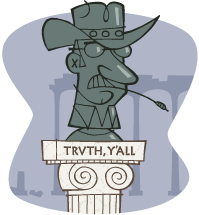
And now, some pithy quotes from the Hillbilly Mencken, Fred Reed. Born and raised in West Virginia, the only state to secede during the war to prevent secession.
“The problem with being a nation of laws is that whoever controls the laws then controls the nation.”
“Much of the unpleasantness of modern life occurs because we will say 'No' to almost nothing.”
“We’re in the middle of learning whether there is anything at all that cannot be inflicted on the American public — whether people with cable TV can rouse themselves to resist, well, anything.”
“The genius of television is that, to shape a people as you want, you don’t need unrestrained governmental authority, nor do you need to tell people what you want of them. Indeed, if you told them what to do, they would be likely to refuse…. No. You merely have to show them, over and over, day after day, the behavior you wish to instill… and slowly, unconsciously, people will come to accept and then imitate them.”
“As empires die, the barbarians usually gather at the gates, preparing a final rush. Unfortunately our savages are already inside…. They do not know that they are savages. They now rule us, and there is nothing we can do about it.”
Filed 2/22/14
Stupid Pet Peeves
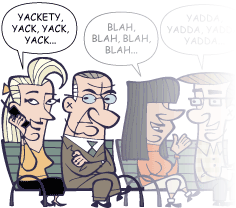
What is it about people talking on cell phones that seems to twist folks panties? Is there an epidemic of second-hand chat? All a cell phone user is doing is having a public conversation. People jabber in public all the time and no-one gives it a second thought. How does doing so on a cell phone different?
On 60 Minutes Morley Safer complained about wasting his time listening to folks gabbing on cell phones. One wonders how much of Mr. Safer’s time was wasted listening to people talking who were not on cell phones. Why was he listening to begin with? Who’s to blame there?
Still, there is a difference. We overhear only one side of the dialog of a cell phone call. This discombobulates us, we’re left hanging, we get frustrated, and thus annoyed. Even when we’re really not paying close attention. It’s sort-of like if one stereo speaker goes out and we can’t hear the singer or lead guitar. The incomplete music just sounds wrong, it’s unlistenable, we can’t stand it, “Turn that off!”
Then again, perhaps we’d be happier if we didn’t eavesdrop. Yeah, that’s gonna happen.
Filed 2/14/14
Seeing the Unseen

Sometimes it pays to think backwards, as it were. Or rather, you can see more from what you don’t see than what you see. It’s the old conspicuous by its absence idea.
A case in point. During World War II, statistician Abraham Wald reviewed battle damage to airplanes returning from sorties over Germany. He found the fuselage and fuel system were much more likely to be damaged by bullets or flak than the engines of returned planes. Our initial reaction might be, “Look at all that fuselage damage. We need better protection there.”
Abraham Wald saw it otherwise and recommended the engines needed better protection. He understood the implications of looking at returned planes rather than planes that did NOT return. If planes all shot to heck but with intact engines returned, it meant planes could sustain that damage. Meanwhile, since planes were not returning with damaged engines it meant those planes were kaput. Hence, the engines needed more protection.
What Mr. Wald saw was what he didn’t see, see? Of course, thinking backwards doesn’t always help. Sometimes it’s just ass-backwards thinking which doen’t seem very helpful at all. Though ass-forward thinking doesn’t sound much better, does it?
Filed 2/8/14
You Hear Something?

inkling (ĭnk′ lĭng) noun, a vague intimation of; a slight knowledge of.
This word just sounds like it’d be something tiny, along the lines of tingling, tickling, tinkling, wrinkling. Though while there is a tingle, tickle, tinkle, and wrinkle there is no inkle. Much like a tinkling is a feint sound, inkling was originally the indistinct hearing of one’s name being spoken. So, you prick up your ears because someone is talking about you. You don’t know what they’re saying about you, though you suspect it’s something, you have an inkling.
This is another of those words that at one time began with the letter N and lost it. Other examples are a napple (an apple), a napron (an apron), and a nadder (an adder). This switch is called metanalysis. In other cases words gained an N. Like how an ewt became a newt or an ekename became a nekename (nickname).
Another word that lost its N was orange, though it never had an N in English. It was the French who seem to have misplaced it, going from une narange and winding up with une arange. Orange traces its roots to the Sanskrit naranga. The English imported orange already sans N from the French because, well, oranges don’t grow in England.
How the House of Orange fits into any of this I have no idea. William of Orange was once the King of England. But he was Dutch and not French. Though maybe I’m comparing napples to noranges.
Filed 1/30/14
Funny Physics

Two theoretical physicists are hopelessly lost in the mountains. One pulls out a map and a calculator and starts punching in numbers. After a few minutes he turns to the other theoretical physicist and says: “I’ve figured it out. Do you see that mountain over there? That’s where we are.”
Why is that funny? Perhaps because you suspect a lot of theoretical physics based on complex math is not quite modeling reality, but leading science down the garden path where errant nonsense is “proved” because, “We have a formula for that.” If so, you’re not the only one.
“Today’s scientists have substituted mathematics for experiments, and they wander off through equation after equation, and eventually build a structure which has no relation to reality.”
—Nikola Tesla
“If scientific reasoning were limited to the logical processes of arithmetic, we should not get very far in our understanding of the physical world.”
—Vannevar Bush
“Many of them [astrophysicists] still believe in formulas which we know from laboratory experiments to be wrong… They are 'generally accepted' by most theoreticians, they are developed with the most sophisticated mathematical methods; and it is only the plasma itself which does not 'understand' how beautiful the theories are and absolutely refuses to obey them.”
—Hannes Alfvén
“Mathematics is well and good but nature keeps dragging us around by the nose.”
—Albert Einstein
Ironic to have an Einstein quote here. The dominance of mathematics over experiment and observation in physics pretty much began with Einstein. Thought experiments are okay as far as they go, but they exist in the mind and not in the real world. Mother Nature may have other ideas.
Filed 1/21/14
Speak and Spell Gone Wild

It’s your name and you can spell or say it any way you want. At least, that seems to be the philosophy behind the screwy spelling-pronunciation mismatches you run across.
Ten English Family Names You’d Never Guess how to Pronounce from the Spelling
- Ayscough - said as - Askew
- Beauchamp — Beechum
- Belvior — Beaver
- Cholmondeley — Chumley
- Dumaresq — Doomerik
- Leveson-Gower — Loosen-Gore
- Marjoribanks — Marchbanks
- Myerscough — Maskew
- Wauchope — Walk-up
- Wriothesley — Roxlee
If you go to Scotland and Wales the names get even odder. Which might not be so surprising when you consider they’re not English, but Gaelic and Welsh. Then again, many of the names on the list were probably Norman-French that came over with William the Conqueror. Not that the French pronounce them like that. These families aren’t even trying.
Filed 1/15/14
There’s Just No Rhyme or Reason to English

Try to explain English spelling. I dare you because I certainly can’t. Sorry. Figure out how these pairs don’t rhyme: to go, has was, sew few, but put, how low, have cave, boot foot, mown down, come home, what that, could mould. How about these triplets: bomb comb womb and bone done gone.
Is it the spellings or the pronunciations that are goofy? These dissimilar spellings rhyme: boo cue do few flu queue shoe through two view who you. These similar spellings don’t rhyme: bough cough dough rough through.
Then again, English syntax can be confusing, too. There’s a sign on a fence near my house reading: “Beware of vicious biker’s dog.” Well then, is it the dog or the biker that’s vicious? What a language. A language where a sentence with eleven of the same word in a row is correct:
John, while Jim had had “had”, had had “had had”; “had had” had had a better effect on the reader.
Filed 1/12/14
Modern Medieval Myths
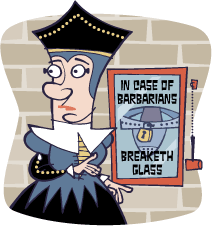
As we weren’t around then to know otherwise, it’s easy to believe a lot of things we’ve heard over and over about the Middle Ages. Though, like a lot of things you hear repeatedly about things today, much of it is stuff and nonsense. The real shame of it, some slipshod historians repeat the myths, too. Here are a few examples.
Chastity belts date from the Renaissance and not the Middle Ages. Even so, they were not designed or used to keep a wife faithful, but were worn for short periods in emergencies. As a castle or town was being attacked and likely to fall, women donned them to protect themselves against rape.
Medieval theologians did not debate how many angels could dance on the head of a pin, or the point of a needle as it went originally. This canard comes via wise-acres making jokes that people later took seriously. Missing the point of satire is nothing new, it seems.
The Medieval church never declared women had no souls. That whole idea started when some wit named Valentius Acidalius in the 1500s published a spoof on the subject. It was a joke that went viral, so to speak.
Still, the superstitious bumpkins burned witches in the Middle Ages, right? Very rarely. Witch burning didn’t gain traction in Europe until the Renaissance when there was an anti-witch hysteria spawned by the Black Death. Medieval cannon law officially stated witches did not exist.
Not only is much of what folks believe about the Middle Ages wrong, so is a lot of what people think about the Renaissance being such an improvement.
Filed 1/9/14
Trivia Quivia

In modern usage the word trivia is both singular and plural. It comes from the Latin trivium, any of the three lesser liberal arts: grammar, logic, and rhetoric. The three together were plural, trivia.
Likely you know a pair of dots above a letter is called an umlaut or a diaeresis. As in coöperate. Did you know a single dot above a letter, as in lower case i and j, is called a tittle?
Via pop culture (The Big Bang Theory) many folks know about Schrödinger’s cat. What they likely don’t know, Schrödinger wasn’t explaining an aspect of the uncertainty principle, he was lampooning it. Despite what Sheldon Cooper says you can think, a cat cannot really be both dead and alive simply because you don’t know which it is. Unless you believe in zombies.
Due to a rare genetic defect, about 6% of people have an extra nipple. Though it seems to me every man has two extra nipples.
I like websites and blogs from Australia. Check out the datelines; you get news from tomorrow! In fact, it’s both Monday and Tuesday as I write this. Spooky. Kinda like Schrödinger’s cat?
Filed 1/7/14